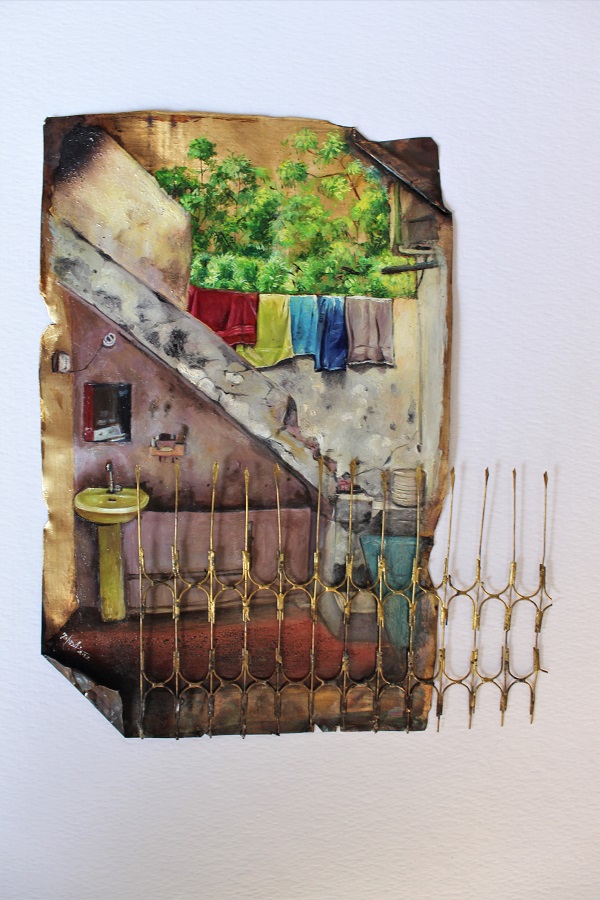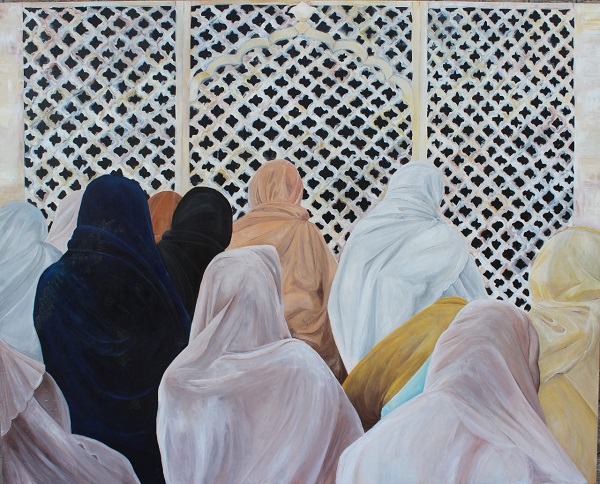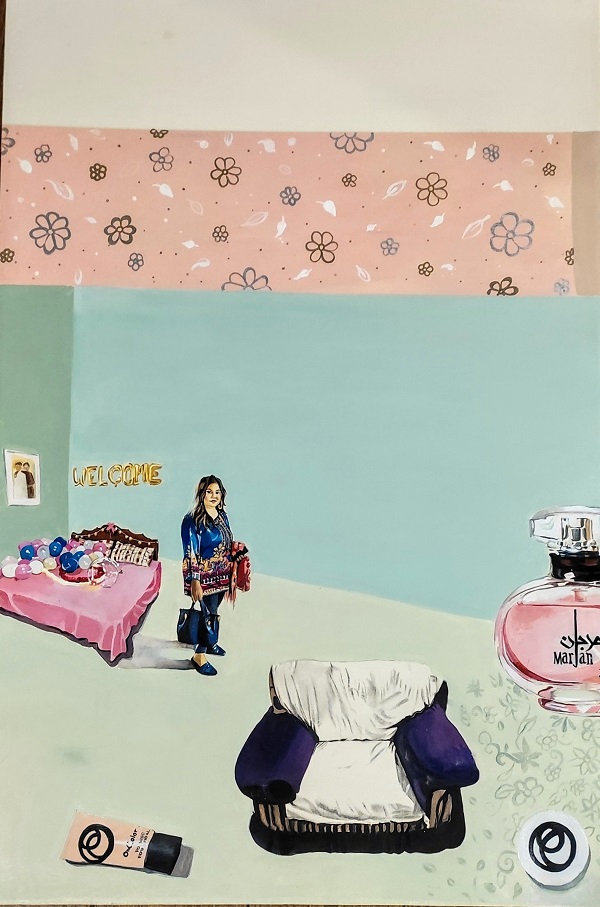
Written by: Nayha Jehangir Khan
Posted on: March 24, 2022 |  | 中文
| 中文
'Maryam Sunny' by Khadija Rehman
This year marks the fifth anniversary of GharPar, which pioneered the digital portal for connecting clients to certified beauty technicians. The founding members of GharPar are Shameelah Ismail, Arooj Ismail, and Fareed Qureshi, who in collaboration with Fakir Saifuddin, Director of Fakir Khana Museum and Zulfiqar Ali Zulfi, Executive Director of Alhamra Centre of Art & Culture, hosted a three-day exhibition that started on March 21st, 2022 with 48 participating artists.
The Alhamra Gallery is designed as a multilevel space, visitors enter the main hall on the ground floor welcomed by a gathering of paintings that include stalwarts like Mashkoor Raza, paired with other diverse artists. The steps lead up to a split-level balcony that is lined with a series of paintings by Ibraheem Hanif Ramay. The artist's long-standing contribution to modern painting in Pakistan is captured in these compositions that depict feminine power and mysticism. Similarly, Quratulain Dar captures the masculine energy choosing to place the head of a lion on the recognizable form of a female body, her painting “Badshah Rani”, pushes the viewer to reexamine their conventional ideas of femininity.
Munawar Ali Syed challenges the viewer to reflect deeply on the struggles and inaccessibility of essential resources with his sculptural piece titled “Bhook”, made with rice sealed into the resin book. An exploration of materiality can also be seen in Irfan Abdullah’s series that uses hairpins, meticulously embedded into the concrete surface resembling text written on larger-than-life pages and tablets. Anila Zulfiqar uses a bright and playful exploration of fabric in “Nostalgic Expressions” that creates an abstract tapestry of color. The work can be read as reflecting the complexity of domestic life, and simultaneously a commentary on the labor-intensive work endured by women. Fatima Salman’s painting shows a garden of ghazals in “Umeed-Sahar Ki Baat Suno”, where the rising sun is a sign of peace shining on the community.
Some artists chose to spend time with various female members of the GharPar community, capturing their likeness and life experiences in portraits and paintings. Khadija Rehman’s “Maryam Sunny” diptych, shows the subject riding a magical cloud through the night sky, her resilient nature and hardworking spirit can be read by the choice of objects held in her hands that represent a passion for her profession. Shireen Rasul’s painting “Shamma” is a nurturing representation, showing the protagonist comforting and holding birds in her hands. The expression on Shamma’s face is kind, and she is wearing a crown of roses with embellished gold earrings that make her appear to be a mythical force emerging from the skies.
The self-portrait of Uneeza Zulfiqar titled “Equality”, shows her in an assertive pose seated similarly as kings in royal paintings. She is lit by a warm light and is wearing a wide gold bracelet, large earrings and a thick necklace of beads. The viewer sees her as a strong and commanding figure, captured here in a moment of deep reflection. Another aspect of the female experience is motherhood, captured by Nyla Talpur in "Untitled". The figure has her back facing the viewer as she holds a baby on her hip, looking out of the window. A visual altar is created by the artist to highlight the struggle and selflessness of women who become mothers.
Being in contact with the employees of GharPar, allowed artists to make observations that were meaningful and insightful. Hira Siddiqui in her painting “Capturing Lubna”, the subject is confidently standing in her bedroom; the artist plays with the scale of the objects in the composition indicating that these are significant items to her subject. Maham Nadeem’s paintings titled "A Portrait" and “Box of Trinkets”, has a portrait of a woman paired with a painting containing beauty products such as false eyelashes, scissors and creams. The two paintings share a bright red color palette that binds the items to the subject.
Ruqaia Abdul Aziz through a unique erasure residue treatment in “9:00am to 9:00pm”, distorts and manipulates the original photograph. In her interaction with the subject, she learned that she was a self-aware and committed mother to her children. In her series, she captures the joyful moments experienced by her subject in her domestic life, and as she considers her children to be her primary focus, the images reflect that sentiment. In the painting “Ummeed” by Hajira Ahmad, there is a gathering of women seated in worship, their collective sense of belief resolute and unwavering.
The psychological exploration of the lived experiences of the community of women belonging to GharPar, became a central theme of the exhibition. Artist Zahra Asim met with GharPar employee Noshi, and visited her residential home. Her empathetic view of how Noshi managed her family and work life, led to the work titled “Makaan Se Ghar Tak Ka Safar”, where the viewer can peer into Noshi’s home safely enclosed behind a gate. Sumera Jawad approaches the sensitive reality of struggling with relationships and life in her paintings, while the protagonists are oblivious to their environment, surrounded by the vastness and emptiness of space.
“Bun Lay Sapnay Apnay” is a showcasing of over 100 works of art that capture the evolution of female representation by pairing established artists with emerging talents of the country. The Curator, Shireen Rasul, shared the positive response the exhibition had received since its conception, first from the participating artists and then the visitors of the show over the course of three days.



You may also like: